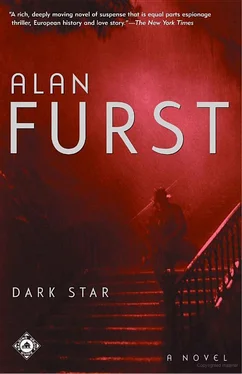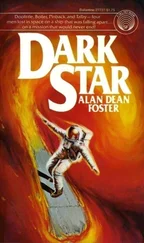Alan Furst - Dark Star
Здесь есть возможность читать онлайн «Alan Furst - Dark Star» весь текст электронной книги совершенно бесплатно (целиком полную версию без сокращений). В некоторых случаях можно слушать аудио, скачать через торрент в формате fb2 и присутствует краткое содержание. Жанр: Шпионский детектив, на английском языке. Описание произведения, (предисловие) а так же отзывы посетителей доступны на портале библиотеки ЛибКат.
- Название:Dark Star
- Автор:
- Жанр:
- Год:неизвестен
- ISBN:нет данных
- Рейтинг книги:3 / 5. Голосов: 1
-
Избранное:Добавить в избранное
- Отзывы:
-
Ваша оценка:
- 60
- 1
- 2
- 3
- 4
- 5
Dark Star: краткое содержание, описание и аннотация
Предлагаем к чтению аннотацию, описание, краткое содержание или предисловие (зависит от того, что написал сам автор книги «Dark Star»). Если вы не нашли необходимую информацию о книге — напишите в комментариях, мы постараемся отыскать её.
Dark Star — читать онлайн бесплатно полную книгу (весь текст) целиком
Ниже представлен текст книги, разбитый по страницам. Система сохранения места последней прочитанной страницы, позволяет с удобством читать онлайн бесплатно книгу «Dark Star», без необходимости каждый раз заново искать на чём Вы остановились. Поставьте закладку, и сможете в любой момент перейти на страницу, на которой закончили чтение.
Интервал:
Закладка:
At a small market he stopped and bought fruit, then paid a few sou extra for a paper bag. The market woman wore a shawl over her head; her glance was suspicious. What was he, a foreigner, doing in this part of the city? Szara walked another block, made sure nobody was watching, and left most of the fruit in an alley. He watched the street behind him in a shop window where wooden soldiers were for sale. Then he moved off again, entering a small square lined by plane trees cut back to rounded pollard shapes for the coming winter. A driver slept in a parked taxi, a man in bleu de travail sat on a bench and stared at his feet, the war memorial fountain was dry: the square at the end of the world. A small brasserie, Le Terminus, had no patrons on its glassed-in terrasse.
Szara, more and more now the critic of his own abduction, was struck by the normalcy of the scene. What a placid, ordinary place they’d chosen. Perhaps they liked the name of the brasserie, Le Terminus-the terminal, the end of the line. Was the choice ironic? Were they that clever? Perhaps Pavlov was not, after all, the day’s guiding spirit; perhaps that honor belonged to Chekhov, or Gorky. He searched for a terminal, for tram tracks, a railroad station, but there was nothing he could see.
Suddenly he was in a hurry. Whatever this was, he wanted it over and done with.
The interior of the brasserie was enormous and silent. Szara stood in the foyer as the door behind him bumped back and forth until it came to rest. Behind the zinc bar a man in a white shirt with cuffs turned back was aimlessly stirring a coffee, a few patrons sat quietly with a glass of beer, one or two were eating. Szara felt himself swept by intuition, a sense of loss, a conviction that this still life of a brasserie in Ostend was a frozen image of what had been and would now vanish forever: amber walls, marble tables, a wooden fan slowly turning on the smoke-darkened ceiling, a florid-faced man with a handlebar mustache who rattled his newspaper into place, the scrape of a chair on the tile floor, the cry of a seagull from the square, the sound of a ship’s horn from the harbor.
There was an old weather glass on one wall, beneath it sat a woman in a brown, belted raincoat with buttoned epaulets on the shoulders. She glanced at him, then went back to eating, a plate of eels and pommes frites; Szara could smell the horse fat the Belgians used for frying. A red wool scarf was looped over the top of an adjacent chair. The glass and the scarf were the recognition signals described in the margin of the newspaper.
The woman was perhaps in her late thirties. She had strong hands with long fingers-the knife and fork moved gracefully as she ate. She wore her chestnut hair cut close and short, a strand or two of gray caught the light when she moved. Her skin was pale, with the slight reddening at the cheekbones of a delicate complexion chapped by a sea breeze. An aristocrat, he thought. Once upon a time. Something fine and elegant in her had been discouraged, she wished to be plain, and almost was. Russian she was not, he thought. German perhaps, or Czech.
When he sat down across from her he saw that her eyes were gray and serious, with dark blushes of fatigue beneath them. The nonsense greetings of the parol, the confirmation passwords, were exchanged, and she lowered the edge of the paper bag he’d carried to make sure there was an orange inside.
Isn’t this all absurd, I mean, oranges and a red scarf and … But these were words he never got to say. Just as he leaned toward her, to make contact, to let her know that they were the sort of people who could easily bridge the nonsense a foolish world imposed on them, she stopped him with a look. It made him swallow. “I am called Renate Braun,” she said. Called meant what? An alias? Or simply a formal way of speaking. “I know who you are,” she added. The notion and that will suffice was unstated but clear.
Szara liked women and they knew it. All he wanted to do, as the tension left him, was chatter, maybe make her laugh. They were just people, a man and a woman, but she wasn’t buying. Whatever this was, he thought, it was not an arrest. Very well, then a continuation of the business he did with the NKVD from time to time. Every journalist, every citizen outside the Soviet Union, had to do that. But why make it into a funeral? Internally, he shrugged. She was German, he thought. Or Swiss or Austrian-one of those places where position, station in life, excluded informality.
She put a few francs on the waiter’s saucer, retrieved her scarf, and they went outside into a hard, bright sky and a stiff wind. A boxy Simca sedan was now parked by the brasserie. Szara was certain it hadn’t been there when he’d gone into the place. She directed him into the passenger seat and positioned herself directly behind him. If she shot him in the back of the neck, he thought, his dying words would be why did you go to all this trouble? Unfortunately, that particular wound didn’t allow for last words, and Szara, who had been on battlefields in the civil war that followed the revolution, knew it. All he’d manage was why-za chto? what for? — but everyone, all the victims of the purge, said that.
The driver turned on the ignition and they drove away from the square. “Heshel,” said the woman behind him, “did it …?”
“Yes, missus,” the driver said.
Szara studied the driver as they wound through the cobbled streets of the city. He knew the type, to be found among the mud lanes in any of the ghettos in Poland or Russia: the body of a gnome, not much over five feet tall, thick lips, prominent nose, small, clever eyes. He wore a tweed worker’s cap with a short brim tilted down over one eyebrow, and the collar of his old suit jacket was turned up. The man was ageless, and his expression, cold and humorous at once, Szara understood perfectly. It was the face of the survivor, whatever survival meant that day-invisibility, guile, abasement, brutality-anything at all.
They drove for fifteen minutes, then rolled to a stop in a crooked street where narrow hotels were jammed side by side and women in net stockings smoked lazily in doorways.
Renate Braun climbed out, Heshel waited. “Come with me,” she said. Szara followed her into the hotel. There was no desk clerk to be seen, the lobby was empty except for a Belgian sailor sitting on the staircase with his head in his hands, a sailor cap balanced on his knee.
The stairway was steep and narrow, the wooden steps dotted with cigarette burns. They walked down a long corridor, then stopped in front of a door with 26 written on it in pencil. Szara noticed a tiny smudge of blue chalk at eye level on the door frame. The woman opened her shoulder bag and withdrew a ring of keys- Szara thought he saw the crosshatched grain of an automatic pistol grip as she snapped the bag closed. The keys were masters, with long shanks for leverage when the fit wasn’t precise.
She unlocked the door and pushed it open. The air smelled like overripe fruit cut with ammonia. Khelidze stared at them from the bed, his back resting against the headboard, his pants and underpants bunched around his knees. His face was spotted with yellow stains and his mouth frozen in the shape of a luxurious yawn. Wound within the sheets was a large, humped mass. A waxy leg had ripped through the sheet; its foot, rigid as if to dance on point, had toenails painted baby pink. Szara could hear a fly buzzing against the windowpane and the sound of bicycle bells in the street.
“You confirm it is the man from the ship? ” she said.
“Yes.” This was, he knew, an NKVD killing, a signed NKVD killing. The yellow stains meant hydrocyanic acid used as a spray, a method known to be employed by the Soviet services.
Читать дальшеИнтервал:
Закладка:
Похожие книги на «Dark Star»
Представляем Вашему вниманию похожие книги на «Dark Star» списком для выбора. Мы отобрали схожую по названию и смыслу литературу в надежде предоставить читателям больше вариантов отыскать новые, интересные, ещё непрочитанные произведения.
Обсуждение, отзывы о книге «Dark Star» и просто собственные мнения читателей. Оставьте ваши комментарии, напишите, что Вы думаете о произведении, его смысле или главных героях. Укажите что конкретно понравилось, а что нет, и почему Вы так считаете.












